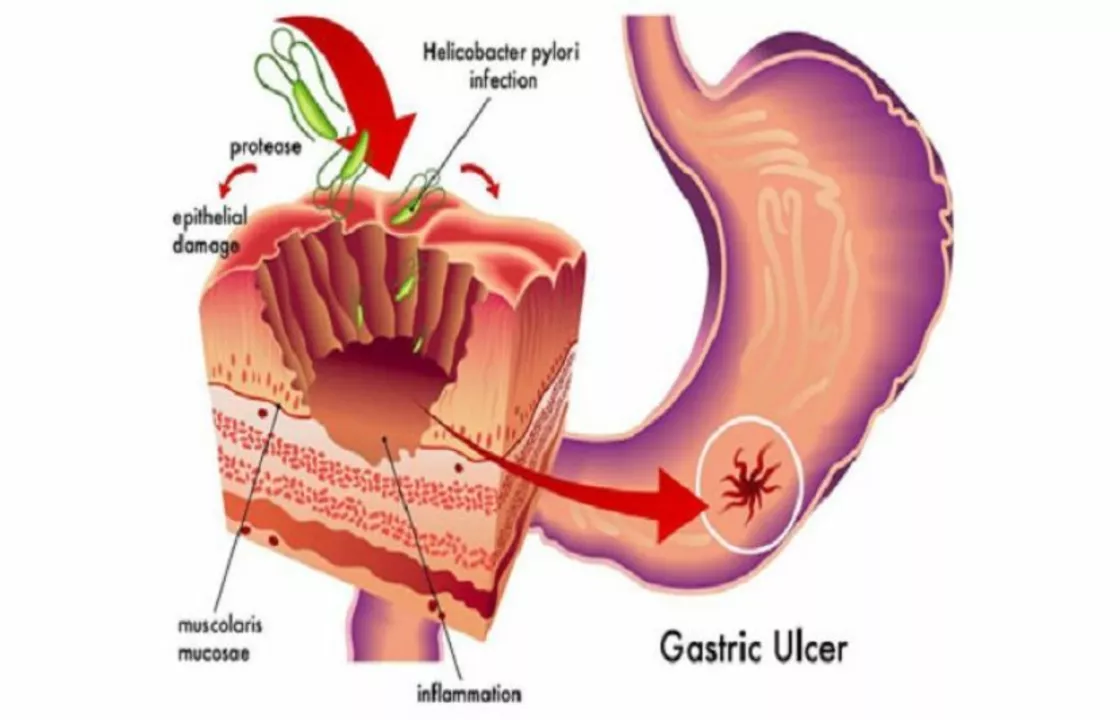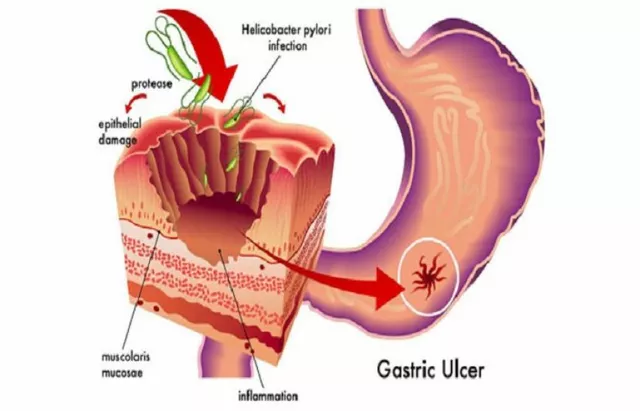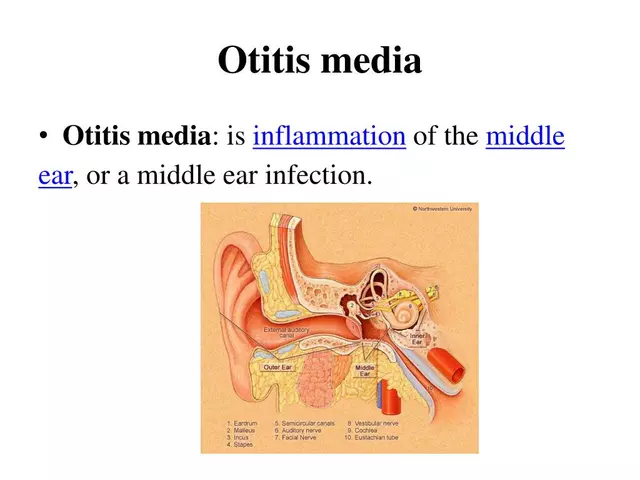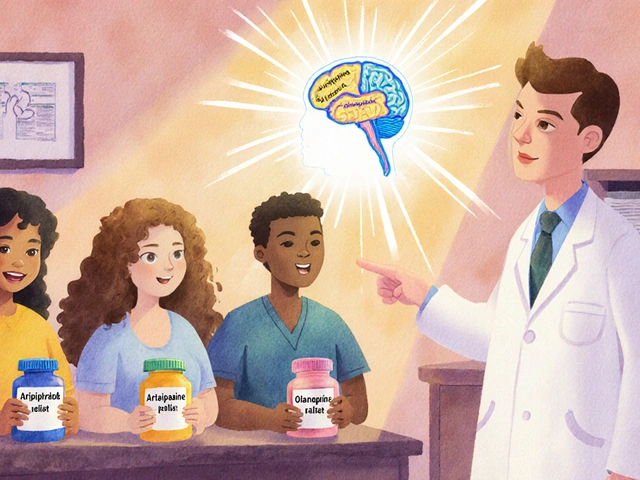30
The Connection between Epigastric Pain and H. Pylori Infection

Understanding Epigastric Pain and H. Pylori Infection
Epigastric pain is a common symptom that many people experience at some point in their lives. It is characterized by a feeling of discomfort or pain in the upper abdomen, usually just below the ribcage. There are numerous potential causes of epigastric pain, and one of the most common is an infection with the bacterium Helicobacter pylori, or H. pylori. In this article, we will explore the connection between epigastric pain and H. pylori infection, as well as how to identify, diagnose, and treat this common condition.
What is H. Pylori and How Does it Cause Epigastric Pain?
Helicobacter pylori is a type of bacteria that can infect the stomach lining and cause inflammation, leading to a variety of gastrointestinal symptoms, including epigastric pain. H. pylori infection is quite common, with approximately half of the world's population carrying the bacteria. It is typically contracted during childhood and can persist for many years if left untreated.
When H. pylori infects the stomach lining, it disrupts the natural balance of stomach acid and protective mucus, leading to irritation and inflammation. This can result in a burning or gnawing pain in the upper abdomen, which is often worse when the stomach is empty or during the night. In some cases, H. pylori infection can also lead to the development of ulcers, which can cause more severe and persistent epigastric pain.
Diagnosing H. Pylori Infection as the Cause of Epigastric Pain
If you are experiencing epigastric pain and suspect that an H. pylori infection may be the cause, it is essential to consult a healthcare professional for an accurate diagnosis. There are several methods available for diagnosing H. pylori infection, including blood tests, breath tests, and stool tests. In some cases, an endoscopy may be necessary to examine the stomach lining and take a biopsy for further analysis.
It is important to note that not all cases of epigastric pain are caused by H. pylori infection, and other potential causes should be considered and investigated by your healthcare provider. These may include gastroesophageal reflux disease (GERD), gastritis, peptic ulcers, and gallbladder or pancreatic issues.
Treating H. Pylori Infection to Alleviate Epigastric Pain
If your epigastric pain is confirmed to be caused by an H. pylori infection, your healthcare provider will likely recommend a course of treatment to eradicate the bacteria and alleviate your symptoms. This typically involves a combination of antibiotics, such as amoxicillin and clarithromycin, along with a proton pump inhibitor (PPI) to reduce stomach acid production. This treatment is commonly referred to as triple therapy and usually lasts for 10 to 14 days.
It is crucial to complete the full course of treatment, even if your symptoms improve before the medication is finished. Failure to do so can result in the bacteria developing resistance to the antibiotics, making it more difficult to treat in the future.
Managing Epigastric Pain during H. Pylori Treatment
While undergoing treatment for H. pylori infection, there are several steps you can take to help manage and alleviate the associated epigastric pain. These may include:
- Eating smaller, more frequent meals to avoid overloading the stomach
- Avoiding trigger foods, such as spicy or fatty meals, that may exacerbate symptoms
- Taking over-the-counter antacids or acid reducers, as recommended by your healthcare provider
- Reducing stress and practicing relaxation techniques, as stress can worsen gastrointestinal symptoms
- Avoiding smoking and excessive alcohol consumption, as these can irritate the stomach lining
Preventing H. Pylori Infection and Epigastric Pain
As H. pylori infection is a common cause of epigastric pain, taking steps to prevent infection can help reduce your risk of developing this uncomfortable symptom. While it is not always possible to avoid H. pylori entirely, maintaining good hygiene practices can help reduce your risk of contracting the bacteria. This includes washing your hands regularly, particularly before preparing or consuming food, and ensuring that food is cooked and stored safely to minimize the risk of bacterial contamination.
Additionally, maintaining a healthy lifestyle and diet can help promote overall gastrointestinal health and reduce the likelihood of developing epigastric pain. This includes consuming a balanced diet rich in fruits, vegetables, and whole grains, staying hydrated, exercising regularly, and managing stress levels.
When to Seek Medical Attention for Epigastric Pain
While epigastric pain is a common symptom that can often be managed at home, it is important to consult a healthcare professional if you experience any of the following:
- Severe or persistent pain that does not improve with over-the-counter medications or lifestyle changes
- Unexplained weight loss
- Difficulty swallowing
- Anemia or signs of internal bleeding, such as dark, tarry stools or vomiting blood
- Symptoms that worsen over time or recur frequently
These symptoms may indicate a more serious underlying condition that requires medical intervention and should not be ignored.
Conclusion: The Connection between Epigastric Pain and H. Pylori Infection
In conclusion, the connection between epigastric pain and H. pylori infection is significant, with the bacteria being a common cause of this uncomfortable symptom. Recognizing the signs of H. pylori infection and seeking prompt diagnosis and treatment can help alleviate epigastric pain and promote overall gastrointestinal health. By maintaining good hygiene practices, adopting a healthy lifestyle, and consulting a healthcare professional when necessary, you can effectively manage and prevent epigastric pain and enjoy a happier, healthier life.











shawn micheal
April 30, 2023 AT 02:27Hey folks, great rundown on H. pylori and that pesky epigastric ache! It's so encouraging to see a clear lay‑out of both diagnosis and treatment. If anyone's feeling anxious, just remember that the triple therapy works like a charm for most people. Keep the stress low and stick to the full course – the bacteria don't stand a chance. Stay positive, you’ve got this!
Stephen Jahl
May 4, 2023 AT 18:52Whilst the exposition delineates the pathophysiological substrate of Helicobacter pylori‑induced dyspepsia, it egregiously neglects to address the bio‑molecular cascade of urease‑mediated gastric pH modulation. One must, in verity, consider the ontogenetic persistence of cagA‑positive strains and their epigenetic ramifications upon the gastric mucosa. Moreover, the author’s omission of the Maastricht V/Florence Consensus is a lamentable oversight. In sum, the treatise would benefit from an integrative, interdisciplinary framework, encompassing microbiome dynamics and host immunogenetics. – S. Jahl
gershwin mkhatshwa
May 9, 2023 AT 11:17Yo, that article broke it down nicely. If you’re grabbing bites, try to snack on some probiotic yogurt – it can help keep the gut balance while you’re on antibiotics. Also, drinking a little herbal tea (like ginger) before bed can soothe that nighttime burn. Keep it chill and don’t stress too much; your gut will thank you.
Louis Robert
May 14, 2023 AT 03:42Consistent small meals really help tame the burning.
tim jeurissen
May 18, 2023 AT 20:07Excuse me, but the phrase “a combination of antibiotics, such as amoxicillin and clarithromycin” should be punctuated with a serial comma before “and”. Also, “proton pump inhibitor (PPI)” is an acronym that requires definition upon first use. Accuracy matters.
lorna Rickwood
May 23, 2023 AT 12:32H. pylori is like a shadow in the stomach it hides and strikes when you least expect it the pain comes like a whisper then a roar you need to listen to your body and seek help
Mayra Oto
May 28, 2023 AT 04:57From a cultural standpoint, many cuisines incorporate fermented foods that naturally combat H. pylori – think kimchi or kefir. Incorporating these into your diet can provide a gentle, probiotic boost alongside prescribed meds. Also, traditional herbal remedies, such as berberine‑rich barberries, have shown antimicrobial properties in some studies.
S. Davidson
June 1, 2023 AT 21:22Honestly, if you’re still blaming every tummy ache on H. pylori after reading this, you’re missing the point. There are countless other culprits – GERD, gallstones, even stress. Stop fixating and get a proper workup.
Haley Porter
June 6, 2023 AT 13:47Consider the phenomenology of epigastric discomfort as a dialectical interplay between microbial colonization and host homeostasis. The epistemic gap narrows when we integrate gastroenterological diagnostics with a biopsychosocial lens, thereby enriching therapeutic outcomes.
Samantha Kolkowski
June 11, 2023 AT 06:12I appreciate the thoroughness of this guide; it’s a helpful reference for anyone navigating H. pylori treatment.
Nick Ham
June 15, 2023 AT 22:37Bottom line: antibiotics kill, acid reducers soothe – stick to the plan.
Jennifer Grant
June 20, 2023 AT 15:02When I first learned about the insidious nature of Helicobacter pylori, I was struck by the sheer ubiquity of this microorganism, lurking silently in the gastric mucosa of half the world’s population, a fact that underscores the profound evolutionary relationship between host and pathogen. The bacterium’s ability to produce urease, thereby neutralizing gastric acid, exemplifies a remarkable biochemical adaptation that facilitates its survival in an otherwise hostile environment. This enzymatic activity not only creates a protective niche but also initiates a cascade of inflammatory responses, leading to the characteristic epigastric pain described in the article. Moreover, the connection between chronic infection and the development of gastric atrophy and even malignancy cannot be understated; it invites a deeper contemplation of the long‑term implications of untreated infection. From a therapeutic perspective, the triple therapy regimen-combining a proton pump inhibitor with clarithromycin and amoxicillin-reflects a strategic assault on both the bacterium and the acidic milieu that sustains it. Yet, the emergence of antibiotic resistance, particularly to clarithromycin, compels clinicians to adopt susceptibility‑guided approaches, highlighting the dynamic interplay between microbial evolution and medical intervention. Lifestyle modifications, such as dietary adjustments and stress management, serve as adjunctive measures that can modulate gastric physiology and potentially enhance treatment efficacy. It is also noteworthy that alternative regimens, including quadruple therapy and sequential therapy, have been explored to overcome resistance patterns, illustrating the field’s adaptability. In addition, the role of probiotics in restoring microbial equilibrium during and after eradication therapy offers a promising avenue for reducing side effects and preventing reinfection. The article’s emphasis on hygiene and preventive measures aligns with public health principles, reminding us that simple practices like handwashing can have far‑reaching consequences. As we contemplate the broader societal burden of H. pylori, it becomes clear that a multidisciplinary approach-integrating gastroenterology, microbiology, nutrition, and patient education-is essential for optimal outcomes. Ultimately, the relationship between epigastric pain and H. pylori serves as a microcosm of the complex interactions that define human health, inviting continual inquiry and compassionate care.
Kenneth Mendez
June 25, 2023 AT 07:27All this pharma talk is just a distraction – the real cause is the government's push to poison us with vaccines and chemicals. If you’re taking antibiotics you’re only feeding the system that wants to control us.
Gabe Crisp
June 29, 2023 AT 23:52We must hold ourselves to the highest moral standard and refuse any treatment that compromises our integrity, even if it means enduring discomfort. Our bodies are temples, not laboratories for testing.
Paul Bedrule
July 4, 2023 AT 16:17In the grand tapestry of existence, the microscopic adversary H. pylori serves as a reminder that impermanence pervades all layers of being, urging us to seek balance between eradication and coexistence.
yash Soni
July 9, 2023 AT 08:42Oh sure, because nothing says “I care about my gut” like popping a bunch of pills and hoping the bacteria don’t develop a super‑virus. Very reassuring.
Emily Jozefowicz
July 14, 2023 AT 01:07Well, isn’t that just a delightful blend of science and culture? Mixing antibiotics with a dash of kimchi sounds like a culinary masterpiece for your stomach.
Franklin Romanowski
July 18, 2023 AT 17:32I totally get how overwhelming it can feel, but you’re not alone in this journey. Following the prescribed regimen and taking those small lifestyle steps can make a huge difference. Stay gentle with yourself.
Brett Coombs
July 23, 2023 AT 09:57Honestly, the whole focus on H. pylori is a smokescreen. The real agenda is to keep us dependent on pharmaceuticals while they profit off our misery.
John Hoffmann
July 28, 2023 AT 02:22Just a quick note: “epigastric” should be capitalized only at the beginning of a sentence, and “H. pylori” needs a space after the period. Consistency in terminology is key.